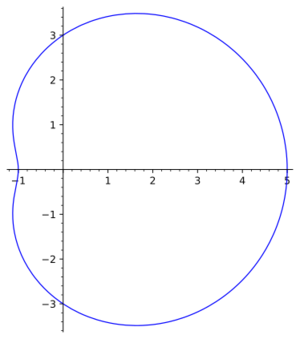Difference between revisions of "Pascal limaçon"
(Category:Geometry) |
|||
| (2 intermediate revisions by 2 users not shown) | |||
| Line 1: | Line 1: | ||
{{TEX|done}} | {{TEX|done}} | ||
| − | A plane algebraic curve of order 4; a [[ | + | A plane algebraic curve of order 4; a [[conchoid]] of a circle of diameter $a$ (see Fig.). |
| − | + | [[File:Pascal limaçon.svg|center|300px|Pascal limaçon with parameters (a,l)=(2,3)]] | |
| − | |||
| − | |||
The equation in rectangular coordinates is | The equation in rectangular coordinates is | ||
| Line 14: | Line 12: | ||
$$\rho=a\cos\phi+l.$$ | $$\rho=a\cos\phi+l.$$ | ||
| − | The coordinate origin is a double point, which is an isolated point for $a<l$, a node for $a>l$, and a cusp for $a=l$ (in this case Pascal's limaçon is a [[ | + | The coordinate origin is a double point, which is an isolated point for $a<l$, a node for $a>l$, and a cusp for $a=l$ (in this case Pascal's limaçon is a [[cardioid]]). The arc length can be expressed by an elliptic integral of the second kind. The area bounded by Pascal's limaçon is |
$$S=\frac{\pi a^2}{2}+\pi l^2;$$ | $$S=\frac{\pi a^2}{2}+\pi l^2;$$ | ||
| − | for $a>l$ the area of the inner leaf must be counted double in calculating according to this formula. The Pascal limaçon is a special case of a [[ | + | for $a>l$ the area of the inner leaf must be counted double in calculating according to this formula. The Pascal limaçon is a special case of a [[Descartes oval]]; it is an [[epitrochoid]]. |
| − | The limaçon is named after | + | The limaçon is named after Étienne Pascal, who first treated it in the first half of the 17th century. |
====References==== | ====References==== | ||
| Line 28: | Line 26: | ||
====Comments==== | ====Comments==== | ||
| − | + | Étienne Pascal (1588–1651) was the father of [[Pascal, Blaise|Blaise Pascal]]. | |
====References==== | ====References==== | ||
| Line 34: | Line 32: | ||
<TR><TD valign="top">[a1]</TD> <TD valign="top"> M. Berger, "Geometry" , '''1–2''' , Springer (1987) (Translated from French)</TD></TR> | <TR><TD valign="top">[a1]</TD> <TD valign="top"> M. Berger, "Geometry" , '''1–2''' , Springer (1987) (Translated from French)</TD></TR> | ||
<TR><TD valign="top">[a2]</TD> <TD valign="top"> F. Gomes Teixeira, "Traité des courbes" , '''1–3''' , Chelsea, reprint (1971)</TD></TR> | <TR><TD valign="top">[a2]</TD> <TD valign="top"> F. Gomes Teixeira, "Traité des courbes" , '''1–3''' , Chelsea, reprint (1971)</TD></TR> | ||
| − | <TR><TD valign="top">[a3]</TD> <TD valign="top"> J.D. Lawrence, "A catalog of special plane curves" , Dover | + | <TR><TD valign="top">[a3]</TD> <TD valign="top"> J.D. Lawrence, "A catalog of special plane curves" , Dover (1972) pp. 113–118; {{ISBN|0-486-60288-5}} {{ZBL|0257.50002}}</TD></TR> |
</table> | </table> | ||
[[Category:Geometry]] | [[Category:Geometry]] | ||
Latest revision as of 08:47, 29 April 2023
A plane algebraic curve of order 4; a conchoid of a circle of diameter $a$ (see Fig.).
The equation in rectangular coordinates is
$$(x^2+y^2-ax)^2=l^2(x^2+y^2);$$
in polar coordinates it is
$$\rho=a\cos\phi+l.$$
The coordinate origin is a double point, which is an isolated point for $a<l$, a node for $a>l$, and a cusp for $a=l$ (in this case Pascal's limaçon is a cardioid). The arc length can be expressed by an elliptic integral of the second kind. The area bounded by Pascal's limaçon is
$$S=\frac{\pi a^2}{2}+\pi l^2;$$
for $a>l$ the area of the inner leaf must be counted double in calculating according to this formula. The Pascal limaçon is a special case of a Descartes oval; it is an epitrochoid.
The limaçon is named after Étienne Pascal, who first treated it in the first half of the 17th century.
References
| [1] | A.A. Savelov, "Planar curves" , Moscow (1960) (In Russian) |
Comments
Étienne Pascal (1588–1651) was the father of Blaise Pascal.
References
| [a1] | M. Berger, "Geometry" , 1–2 , Springer (1987) (Translated from French) |
| [a2] | F. Gomes Teixeira, "Traité des courbes" , 1–3 , Chelsea, reprint (1971) |
| [a3] | J.D. Lawrence, "A catalog of special plane curves" , Dover (1972) pp. 113–118; ISBN 0-486-60288-5 Zbl 0257.50002 |
Pascal limaçon. Encyclopedia of Mathematics. URL: http://encyclopediaofmath.org/index.php?title=Pascal_lima%C3%A7on&oldid=34015
